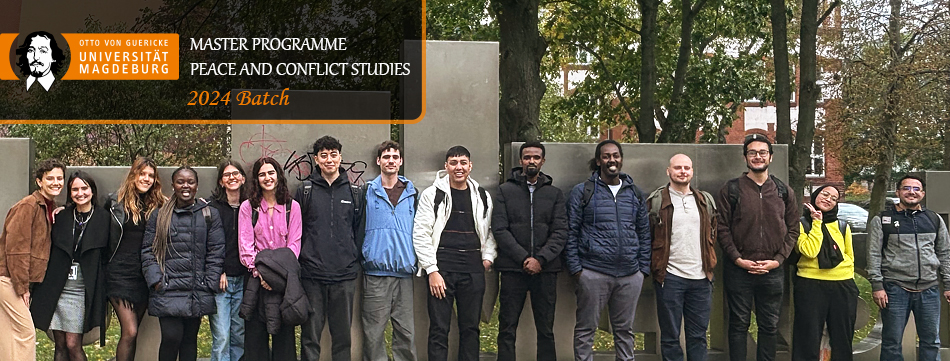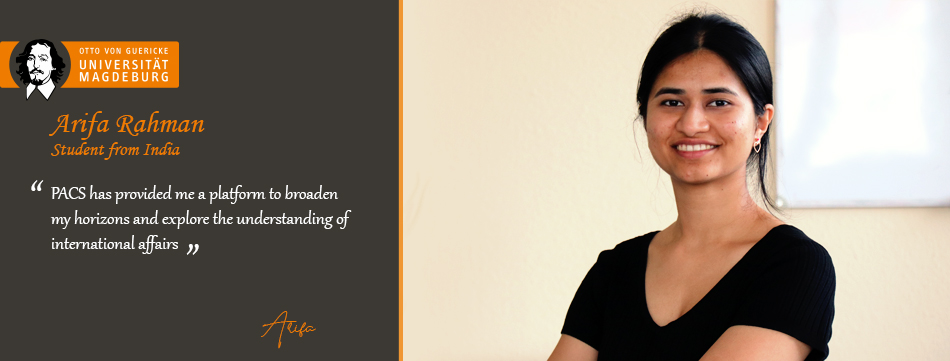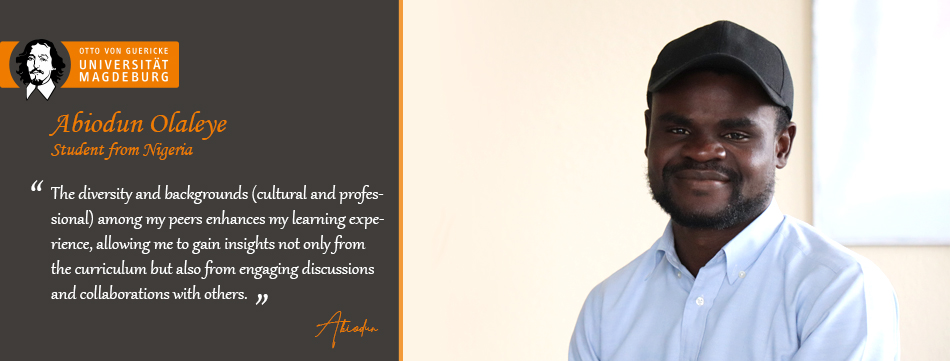Our Students






"My interest in Peace and Conflict has always been in Peacebuilding but this programme has shaped my options to venture into other interest areas to strengthen my career goals.
The diversity of the programme is something I am really interested in because it brings out different yet thoughtful perspectives of the conflicts around the world with cultural sensitivity lenses central to everyday engagement"
~Amadou Ceesay from The Gambia

"One of the most exciting and amazing aspects of the OvGU Peace and Conflict Studies master program is the strong sense of community it builds. I have learned and developed even more than I could have imagined, as an academic in this field but also as an individual. For that I am thankful to, on the one hand, the diverse academic perspectives and expertise brought by our lecturers, and on the other hand, the plurality of personal connections and experiences I got to share with my fellow PACS students"
~Andréa Noël from Canada

“This is a flexible programme oriented toward academic production, but the whole PACS experience is much more for me. In Ernesto Sábato’s words, “a climate of beauty in the small world around us”
~Daniel Barrera from Colombia

"I found Peace and Conflict Studies an opportunity to foster my knowledge in this area, which is still unpopular in my country. The study program offers courses and seminars in diverse areas, including communications and journalism, that match my professional goals. Moreover, learning from teachers and international colleagues is always thrilling"
~Sofia Aureli from Brazil

…

We are pleased that we were able to welcome a diverse and highly motivated new batch to our master's program despite the difficult global situation. The photo was taken at the 2020 PACS Introduction Days, which ran primarily online this year. Unfortunately, not all students can be seen on it. This year’s cohort is the largest PACS cohort to date and consists of students from various countries and academic backgrounds.

This time it took a little bit longer until we could take a picture of the new batch. Even though not all new students are present on this photo, we wanted to express our joy that that the 2019 class is again very diverse both in terms of the students' countries of origin and their academic background. The new Peace and Conflict Studies class consists of students from Germany, Spain, the USA, Brazil, Ukraine, the Philippines, South Korea, Bangladesh and Syria. In their bachelor's degree, the new students have studied a variety of different courses, including anthropology, ethnology, communication sciences, journalism, economics, European studies, social sciences and various languages.

The Master's Programme Peace and Conflict Studies lives from the interdisciplinarity of its teaching but maybe even more so from the interdisciplinarity of the attending students. We are therefore very glad to have in 2018 again students from a wide range of academic and professional backgrounds, ranging from Sociology, Cultural Studies and International Relations to International Social Work, Latin American Studies and Communication. Furthermore, joining us in Magdeburg are 6 international students from Turkey, Pakistan, the United States and Nigeria.

In 2017, a total of 17 students started the PACS Master in Magdeburg. Among them were 5 international students from Peru, Ukraine, Cambodia, Russia and Mongolia.

'As a Bolivian student, the Master in Peace and Conflict Studies gives me the possibility to establish a horizontal and open exchange of cultures and knowledge. From a human and academic dimension, local complexities and global ambivalences found space for dialogue and generate new perspectives for the analysis. The language challenge, of course, is an important part of the experience.'

'One of the programme's strengths certainly is the diversity of academic and professional backgrounds by its students. Due to the considerable accessibility of different disciplines, various approaches turn up to deal with specific issues. Accompanied by the internationality of the students it is possible to take a view on conflicts from completely new perspectives, which in fact seems necessary with regard to the worlds many crises.'

'Coming from a region full of political conflicts urged me to be involved in political life since I was 18, now it's the high time to achieve peace in the Middle East. Studying this programme gives me the chance to see things from different and thoughtful perspectives.'

'Because of my previous experience as language teacher in Colombia and my interest for the future of the military in my homeland, I am looking for a qualification, which enables me to gain an comprehensive understanding of conflicts from a multidisciplinary point of view as well as handle them creatively. At the OVGU I did not only find gladly both, but also political committed partners.'

'The Master’s Degree Peace and Conflict Studies in Magdeburg offers many opportunities. The professors provide an environment where I can choose which topics I want to pursue. They listen to new ideas and give support and expertise to follow them. Overall, there is a strong sense of community this personal touch makes studying at the Otto-von-Guericke University Magdeburg unique.'

'After working for a while in the field of German development cooperation in Kyrgyzstan I had a big desire to gain an understanding of conflict management theories and peace promotion instruments. At the OVGU I have found a good mixture of theory and praxis. Moreover, the learning process is encouraged by cooperation, support, and engagement of the both sides, lecturers and students, which also enables to exchange ideas, transfer knowledge and create networks for the professional experience.'

'To study Peace and Conflict Studies at the OvGU was the right choice for me! I am excited that the study programme enables to study on an interdisciplinary basis and to engage with questions of global and societal connections, but one can also specialise in a particular field of interest. I greatly appreciate the lively discussions on topics as climate change with a critical view of the system, which do not only take place outside the teaching but are also part of many seminars. And not the least, Magdeburg is a great place to commit oneself and get involved in the social transformation.'

'As a journalist coming from Brazil, where Peace and Conflict Studies are not yet a prominent research area, I found in Magdeburg an effervescent ground to reflect on theories, discuss ideas and develop new insights. The atmosphere in the OVGU is international and cooperative. Everyone knows everyone and the close connection between students and lecturers is another invaluable asset, ensuring fruitful and challenging exchanges.'




